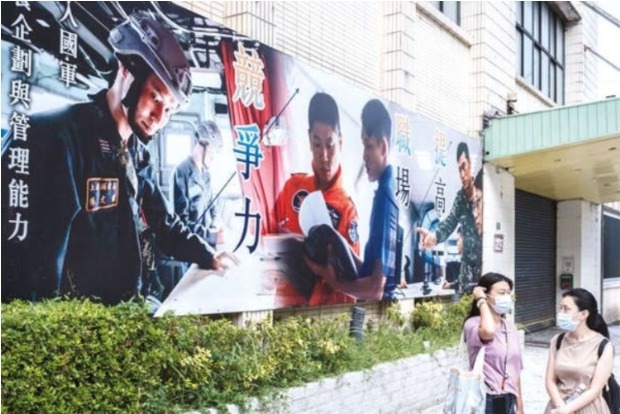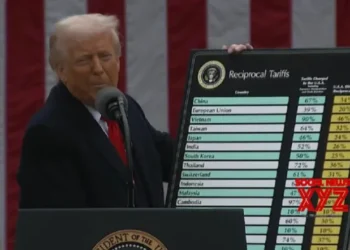US and China lock horns over Taiwan
The self-ruled island has moved to the heart of deepening discord and rivalry between the two superpowers, with the potential to ignite military conflagration and reshape the regional order.
The 25 Chinese fighter jets, bombers and other warplanes flew in menacing formations off the southern end of Taiwan, a show of military might on China’s National Day, Oct. 1. The incursions, dozens upon dozens, continued into the night and the days that followed and surged to the highest numbers ever Monday, when 56 warplanes tested Taiwan’s beleaguered air defenses. Taiwan’s jets scrambled to keep up, while the United States warned China that its “provocative military activity” undermined “regional peace and stability.” China did not cower. When a Taiwanese combat air traffic controller radioed one Chinese aircraft, the pilot dismissed the challenge with an obscenity involving the officer’s mother.
As such confrontations intensify, the balance of power around Taiwan is fundamentally shifting, pushing a decades-long impasse over its future into a dangerous new phase. After holding out against unification demands from China’s communist rulers for more than 70 years, Taiwan is now at the heart of the deepening discord between China and the U.S. The island’s fate has the potential to reshape the regional order and even to ignite a military conflagration — intentional or not. “There’s very little insulation left on the wiring in the relationship,” Danny Russel, a former assistant secretary of state, said, “and it’s not hard to imagine getting some crossed wires and that starting a fire.” China’s military might has, for the first time, made a conquest of Taiwan conceivable, perhaps even tempting. The U.S. wants to thwart any invasion but has watched its military dominance in Asia steadily erode. Taiwan’s own military preparedness has withered, even as its people become increasingly resistant to unification. All three have sought to show resolve in hopes of averting war, only to provoke counter-moves that compound distrust and increase the risk of miscalculation. At one particularly tense moment, in October 2020, U.S. intelligence reports detailed how Chinese leaders had become worried that President Donald Trump was preparing an attack. Those concerns, which could have been misread, prompted Gen. Mark A. Milley, the chair of the Joint Chiefs of Staff, to call his counterpart in Beijing to assure otherwise. “The Taiwan issue has ceased to be a sort of narrow, boutique issue, and it’s become a central theater — if not the central drama — in U.S.-China strategic competition,” said Evan Medeiros, who served on President Barack Obama’s National Security Council.
China’s ambitious leader, Xi Jinping, now presides over what is arguably the country’s most potent military in history. Some argue that Xi, who has set the stage to rule for a third term starting in 2022, could feel compelled to conquer Taiwan to crown his era in power. Xi said Saturday in Beijing that Taiwan independence “was a grave lurking threat to national rejuvenation.” China wanted peaceful unification, he said, but added: “Nobody should underestimate the staunch determination, firm will and powerful ability of the Chinese people to defend national sovereignty and territorial integrity.” Until recently, the U.S. believed it could hold Chinese territorial ambitions in check, but the military superiority it long held may not be enough. When the Pentagon organised a war game in October 2020, a U.S. “blue team” struggled against new Chinese weaponry in a simulated battle over Taiwan. China now acts with increasing confidence, in part because many officials, including Xi, hold the view that U.S. power has faltered. The United States’ failures with the COVID-19 pandemic and its political upheavals have reinforced such views.
Some advisers and former officers in China argue that the U.S. no longer has the will to send forces if a war were to break out over Taiwan. Under the right conditions, others suggest, the People’s Liberation Army could prevail if it did.
A historic mission
Two days after the fall of Kabul in August, as the Biden administration scrambled to evacuate thousands stranded by the U.S. withdrawal, China staged military exercises explicitly designed to show off its prowess. Chinese warships fired missiles into the sea south of Taiwan, while amphibious landing vehicles swept ashore a beach in China. It was one of the largest exercises ever to simulate an invasion across the Taiwan Strait. In previous drills, the People’s Liberation Army maintained a gauze of deniability about its imagined adversary, but this time it left no doubt. One officer on Chinese television warned the U.S. and Taiwan “not to play with fire on the Taiwan issue and immolate themselves.” The question is whether Xi intends to act.
Any assault on Taiwan, which lies 100 miles off the coast, would require overwhelming military advantage. Even if Chinese forces seized control over the island of 24 million, the war would badly shake China’s economy and international relations, while exacting a significant human toll. “Even moderate voices in Beijing have been calling for tossing out peaceful reunification,” said Oriana Skylar Mastro, a fellow at Stanford University’s Freeman Spogli Institute for International Studies.
“I think the military option is the option now.” China’s leaders began the long, politically fraught process of overhauling the People’s Liberation Army after watching the U.S. put its military power on display in the Persian Gulf war against Iraq in 1990.
Six years later, they understood just how far behind their military had fallen when the U.S. dispatched two aircraft carriers near Taiwan in response to China firing missiles into the seas near the island. After the U.S. show of force, China backed down. Robert L. Thomas, a former vice admiral who commanded the U.S. Navy’s Seventh Fleet in Japan, recalled a meeting with a Chinese admiral in 2015. The admiral told him that the 1996 confrontation still stung nearly two decades later. “It’s clear to me that they won’t allow themselves to be embarrassed again by a Taiwan Strait crisis where the U.S. Seventh Fleet shows up and says, ‘Everybody calm down,’” Thomas said.
Since then, China’s leaders have poured money into the People’s Liberation Army. In a decade, military spending grew by 76%, reaching $252 billion in 2020, according to the Stockholm International Peace Research Institute. (The U.S. spent $778 billion on its military last year.) Xi has also reorganised the military, raising the status of naval and air forces and pushing commanders to master joint warfare. In an exercise last year, the military conducted a drill that simulated sealing off the Taiwan Strait from outside forces. What was unthinkable in 1996 could now be within reach. The exercise was like “trapping a turtle in a jar,” said a website run by China’s office for Taiwan affairs.





















